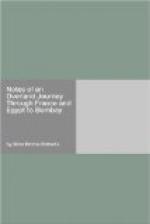In nearly every transaction with servants in India we find them most unscrupulous respecting the truth of any account which they give, and yet at the same time they will fulfil every engagement they enter into with a conscientiousness almost unknown in Christian countries. The lowest servant of the establishment may be trusted with money, which will be faithfully appropriated to the purpose for which it was intended, but certainly they entertain little or no respect for abstract truth.
The controversy at home concerning the general disregard to accuracy manifested by the natives of India has caused much consternation here, and will, I trust, be productive of good. It will show at least to the large portion of the native community, who can understand and appreciate the value of the good opinion of the country of which they are fellow-subjects, the necessity of a strict adherence to veracity, in order to maintain their pretensions to morality, and it will evince the superiority of that religion which, as one of its precepts, teaches a regard for truth.
Willing as I feel to bear testimony to many excellent points in the native character, I regret to say, that, although they do not deserve the sweeping accusations brought against them, the standard by which they are guided is very low. At the same time it must be said, that the good faith which they observe, upon occasions in which persons guided by superior lights would be less scrupulous, shows that they only require a purer religious system to regard truth as we have been taught to regard it.
CHAPTER XI.
* * * * *
BOMBAY—(Continued.)
* * * * *
Residences for the Governor—Parell—Its Gardens—Profusion of Roses—Receptions at Government-house—The evening-parties—The grounds and gardens of Parell inferior to those at Barrackpore—The Duke of Wellington partial to Parell—Anecdotes of his Grace in India—Sir James Mackintosh—His forgetfulness of India—The Horticultural Society—Malabar Point, a retreat in the hot weather—The Sea-view beautiful—The nuisance of fish—Serious effects at Bombay of the stoppage of the trade with China—Ill-condition of the poorer classes of Natives—Frequency of Fires—Houses of the Parsees—Parsee Women—Masculine air of the other Native Females of the lower orders who appear in public—Bangle-shops—Liqueur-shops—Drunkenness amongst Natives not uncommon here, from the temptations held out—The Sailors’ Home—Arabs, Greeks, Chinamen—The latter few and shabby—Portuguese Padres—Superiority of the Native Town of Bombay over that of Calcutta—Statue of Lord Cornwallis—Bullock-carriages—High price and inferiority of horses in Bombay—Hay-stacks—Novel mode of stacking.
There are three residences for the accommodation of the Governor of Bombay; one, the Castle, situated within the Fort, has been long disused, and appropriated to government-offices; a second, at Malabar Point, is intended as a retreat for the hot weather; Parell, the third, being the mansion most usually occupied.




